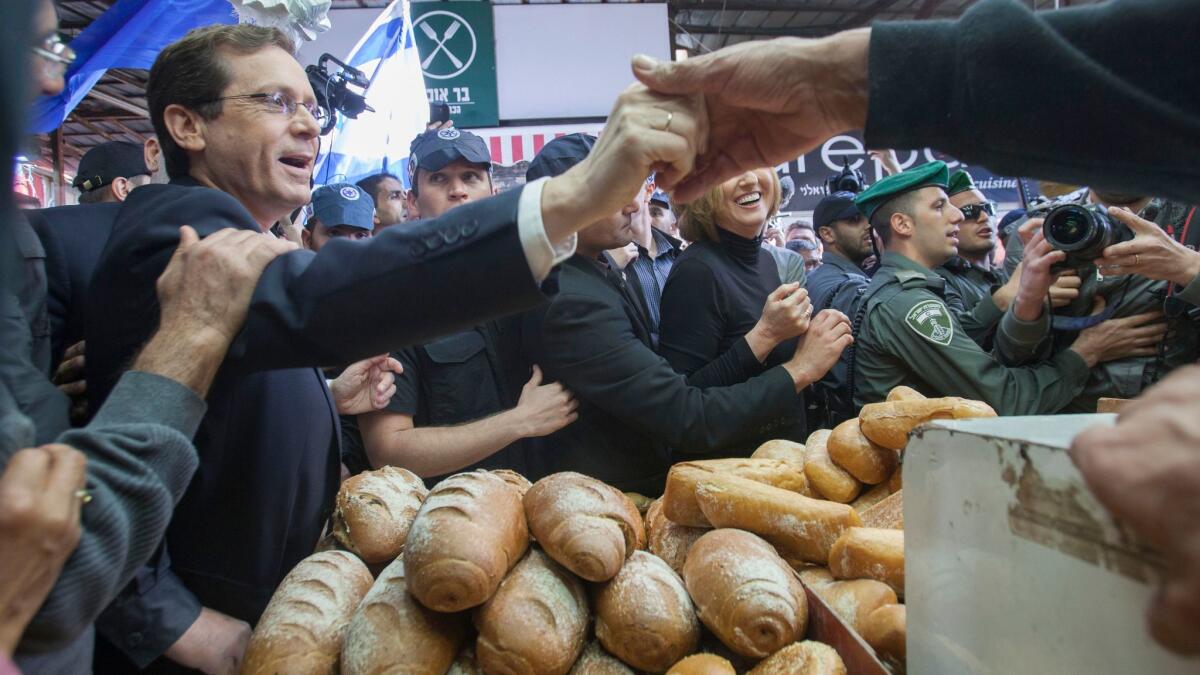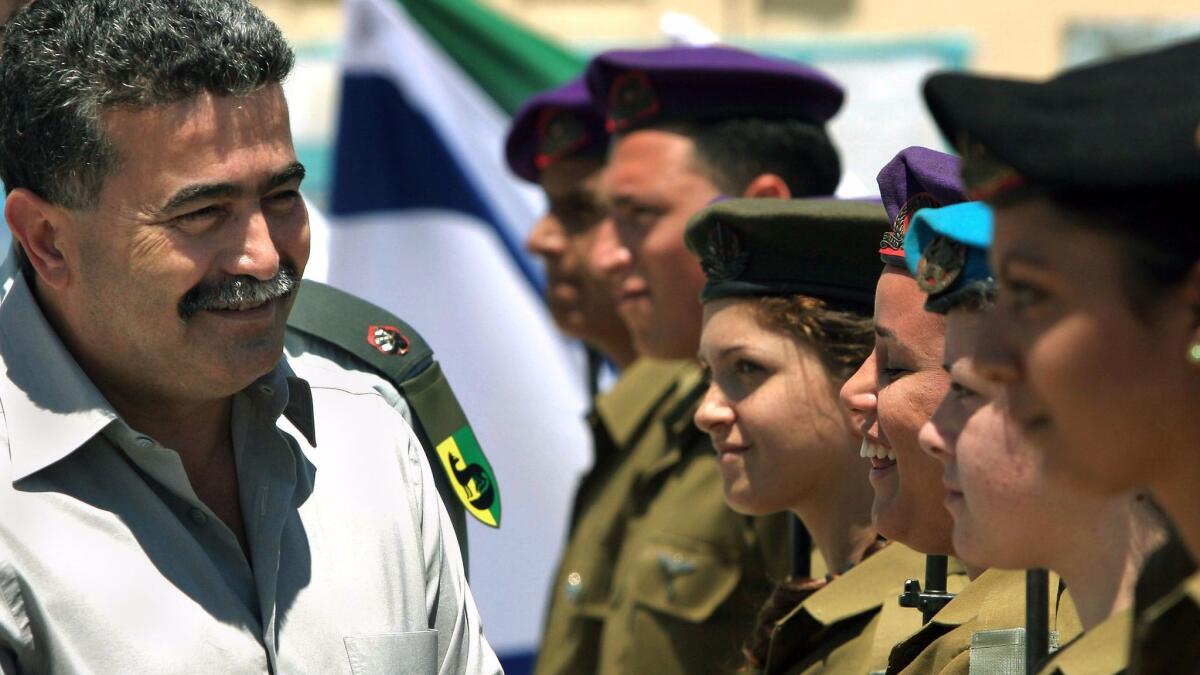Israel’s Labor Party ousts chairman in leadership vote as it struggles to challenge Netanyahu

- Share via
Reporting from Tel Aviv — Israeli opposition leader Isaac Herzog was routed in the first round of the Labor Party leadership election Tuesday, as the political movement that led the country for years continues its struggle to regain relevance.
The primary election was won by Amir Peretz, a former Labor chairman and defense minister, with 33% of the vote. Avi Gabbay, a newcomer who defected from a center right party in Prime Minister Benjamin Netanyahu’s coalition, finished second with 27%. Peretz and Gabbay face a runoff vote July 10 to determine who becomes the new party chairman and opposition leader.
Herzog finished a distant third with 17% of the vote.
Though the party currently leads the opposition bloc in the Israeli parliament, the Knesset, Labor is struggling with a dormant peace process, an electorate that has shifted to the right in recent years, and a seeming lack of a charismatic political leader to reinvigorate the party base and attract new supporters.
Television news opinion polls in the spring suggested the party would lose half of its seats in the current parliament, and finish in fourth or fifth place, reflecting Herzog’s lackluster appeal.
The success of Peretz and Gabbay, both of whom have Moroccan roots, raises the possibility that they will be able to boost the party’s appeal among Israel’s Middle Eastern Jewish population, which resents Labor as a party of secular European elites and prefers Netanyahu’s Likud party.

“We are not a closed club,” Gabbay told supporters after the results were announced.
Ever since the Camp David peace negotiations in 2000 collapsed and gave way to a Palestinian uprising, leading to the collapse of the last Labor-led government, the party has struggled to articulate a new vision for Israel’s national security and peace diplomacy, analysts say.
Waves of conflict with Hezbollah, Hamas and Palestinian lone wolf attackers, along with regional instability, have shaken Israeli optimism about a peace deal and strengthened right wing parties in the parliament. Meanwhile, Labor voters have sacked seven party chairmen since 2001.
As hopes for a peace deal with Palestinians have dimmed, the party has shifted focus in recent elections to socio-economic issues, hoping to strike a chord with the Israeli middle and working class voters squeezed by surging housing costs.
Lacking any specific policy or clear ideological identity, Labor is simplistically branded ‘leftist’ or ‘old’ by most Israelis and dismissed.
— Dahlia Scheindlin, an Israeli American public opinion expert
But when voters go to the polls, it’s usually issues of peace and security that dominate, said Nimrod Novik, a former advisor to Israeli Prime Minister Shimon Peres.
“With the collapse of the peace process, years ago, Labor lost its primary banner,” Novik said. “Labor has lost its security credentials in the public mind because its leaders didn’t convey the same security authority as Netanyahu.”
Years of joining right wing-dominated governments or flirting with joining have muddied Labor’s image. After Herzog vowed that he wouldn’t join a coalition with Netanyahu after the election, the Israeli media revealed that he secretly discussed with Netanyahu a unity coalition government that would promote a new peace process with the Palestinians.
“The problem nowadays is that Labor talks big about opposition but it’s not clear to Israelis what that means,’’ said Dahlia Scheindlin, an Israeli American public opinion expert and former campaign advisor to Labor.
“Lacking any specific policy or clear ideological identity, Labor is simplistically branded ‘leftist’ or ‘old’ by most Israelis and dismissed,” Scheindlin said.
Israelis know Labor as the descendant of Mapai, the party led by the country’s first Prime Minister, David Ben Gurion. Labor is also known as the party of former Prime Ministers Yitzhak Rabin and Shimon Peres, who concluded peace treaties with the Palestinians and Jordan.
Labor used to win significant support from diverse constituencies such as Israel’s Arab minority and working-class Middle Eastern Jews, and Orthodox Jews, but in recent years has shrunk to a party of secular elites of European descent, said Daniel Ben Simon, a former Labor parliament member and journalist.
Peretz is a former labor union leader who led Labor to a second place finish in the 2006 election. Peretz lost the party leadership due to disappointment with his role as defense minister during Israel’s inconclusive war with Hezbollah in the same year.
Before joining Labor less than a year ago, Gabbay, a former telecommunications executive, ran for parliament with the center-right Kulanu party in the 2015 election, and served as environment minister in Netanyahu’s government.
But despite the prospect of a fresh start with a new leader, party members at a polling station in Tel Aviv said few of the candidates seemed to inspire much excitement.
“We haven’t succeeded in choosing a candidate who can sway the masses. We haven’t found a candidate that is both a security hawk, charismatic and knows how to communicate,’’ said Keren Pesah, a 43-year-old lawyer. Though she voted for Gabbay, she admitted “he doesn’t seem [charismatic] either.’’
ALSO
With Israeli decision on prayers at Western Wall, some see diminished clout of liberal U.S. Jews
Bedouins in the West Bank hold fast to their land — as pressure builds for them to leave
Stakes are high for Trump’s meeting with Putin. Here’s what to expect.
Mitnick is a special correspondent.
More to Read
Sign up for Essential California
The most important California stories and recommendations in your inbox every morning.
You may occasionally receive promotional content from the Los Angeles Times.










